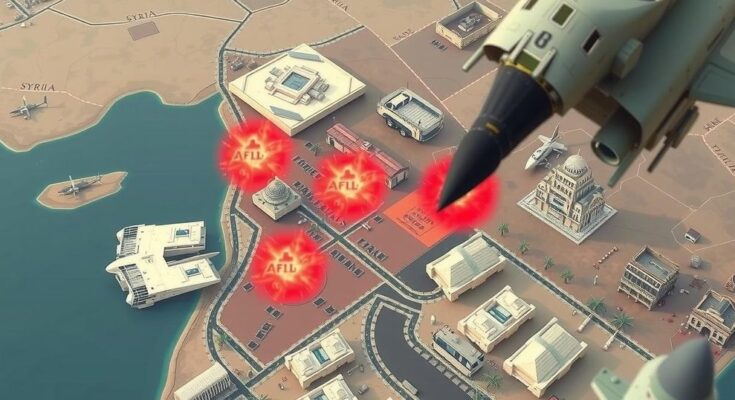Israel has intensified its airstrikes against military targets in Syria, focusing on weapon depots and air defenses, to prevent extremists from acquiring military equipment following the recent power shift. Reports indicate over 450 strikes have occurred since the Assad regime’s collapse, with military officials asserting that these actions are essential for national security.
The Israeli military conducted a series of airstrikes targeting multiple military installations in Syria, including weapons depots and air defense systems, according to the Syrian Observatory for Human Rights. These strikes are a continuation of Israel’s efforts to prevent military hardware from being obtained by extremist groups following the recent shift in power among Syrian rebel factions. Reports indicate that Israel has executed approximately 75 aerial operations against Syrian targets, particularly around Damascus, Hama, and Homs, since the regime’s collapse.
In the past week, Israel’s air assault has escalated significantly, totaling over 450 strikes since the fall of the al-Assad regime, which has resulted in the destruction of numerous military assets, including ammunition depots and air bases. The Israeli military has also established a foothold in Syrian territory, indicating no clear timeline for withdrawal, asserting its presence as a means of meeting security demands. No immediate response has been given from Israeli authorities regarding the latest military actions.
The context of the ongoing Israeli airstrikes in Syria lies in the recent power shift following the collapse of President Bashar al-Assad’s regime. The political turmoil in Syria has raised international concerns regarding the potential for extremist groups to exploit the ensuing security vacuum. Israel’s consistent military actions aim to counteract the threat posed by groups such as Islamic State and Hayat Tahrir al-Sham, the latter of which is reported to have established a new governing authority in Damascus. Furthermore, Israel’s stated objectives highlight the need to uphold its own national security amidst an unstable neighbor.
In conclusion, Israel’s aerial operations in Syria are predominantly driven by strategic security concerns in the wake of the Syrian conflict’s significant developments. The Israeli military’s actions are portrayed as necessary measures to preemptively obstruct extremist access to weaponry while maintaining control over its borders. With the ongoing instability in the region, the future of Syria remains uncertain, with various factions vying for control and external powers closely monitoring developments.
Original Source: www.nytimes.com




